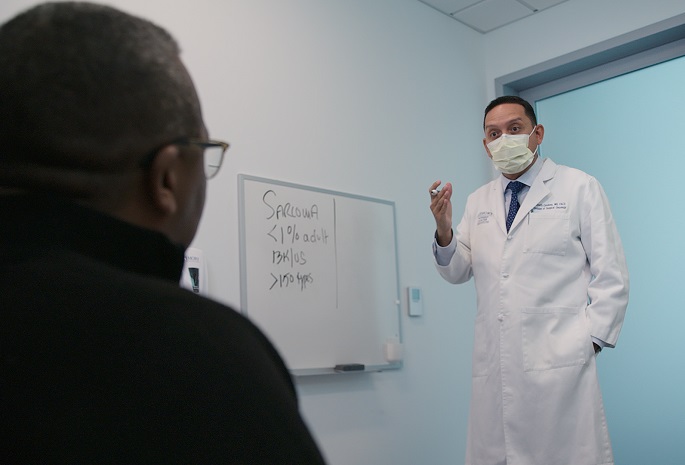Five Early Distress Warnings of Digestive Cancer
- Yellow eyes or skin. The pancreas uses a greenish-brown fluid made in the gallbladder, called bile, to help the small intestine with digestion. If a tumor starts in the head of the pancreas, it can block or press on the bile duct and cause bile to build up. This back up causes yellow discoloration called jaundice.
- Belly pain. Pain has been described as distressing, as compared to a sharp cramp or ache. Pain may go away when you lean forward because it and spreads toward the back.
- Change in stool. Pale, floating, smelly stools. Or dark stools. Let your stool be a guide. If a pancreatic tumor prevents digestive fluids from reaching the intestine, the result is an inability to digest fatty foods. Anytime there is a change with digestion then check in with your doctor. It may not be a sign of digestive cancer, but you do need to be aware of your own body function to determine what is or is not “normal.”
- Lack of appetite. Or sudden, unexplained weight loss. A drop in appetite and a tendency to feel full after eating very little is something to be aware of. Again, it may not be alarming but you do need to be aware of your own body function to determine what is or is not “normal.”
- Diabetes, especially if unexpected from regular checkups. Most diabetes diagnoses are not due to pancreatic cancer; however, research studies show that pancreatic cancer patients have a higher rate of diabetes diagnosis than the general populace. Knowing your family history of pancreatic cancer and having a baseline of regular screening will help your doctor evaluate if additional tests should be done.
Schedule Annual Screenings
Being an advocate for your health starts with healthy behaviors; tobacco use, particularly cigarette smoking, accounts for 20-30% of pancreatic cancer. Knowing risk factors you should avoid (such as smoking) and being aware of what your body is signaling will help you in early detection as well as potential outcomes.
Annual screenings to check for chronic health conditions, such as high blood pressure, heart disease, diabetes, and cancer, are an important part of staying healthy. Scheduling a regular exam with your primary care provider also gives you the opportunity to discuss any health concerns you may have. Find a doctor near you and schedule a well visit today.
About Emory Healthcare
At Emory Healthcare we’re here to help you find the care you need when you need it. With more than 2,800 doctors and 300 locations, including 11 hospitals, and hundreds of primary care offices, urgent cares, and MinuteClinics, we’re delivering specialized care across the region, find a doctor near you to help you get and stay healthy.


 David A. Kooby, MD, FACS, specializes in laparoscopic/robotic and open surgical treatment of liver, bile duct, pancreas, stomach, and colon tumors/cancers. He also has expertise with tumors and diseases of the spleen, adrenal glands, and retroperitoneum. He has taught many national courses on laparoscopic resection of the liver, pancreas, and colon, and is frequently invited to speak at national conferences. He received his MD at the State University of New York, Downstate Medical College, Brooklyn, NY, in 1994; completed his surgical residency at Vanderbilt University, where he won medical student and resident teaching awards. He completed both bench research and clinical fellowships at Memorial Sloan-Kettering Cancer Center, New York, NY. He was recruited by Emory in 2003 and is currently an Associate Professor of Surgery in the Division of Surgical Oncology, Director of Surgical Oncology at Emory/Saint Joseph’s Hospital, and Director of Minimally Invasive GI Surgical Oncology. He serves on several national committees including the task force charged with updating the staging of hepatobiliary malignancies for the American Joint Committee on Cancer’s Cancer Staging Manual, the research and education committee for the American Hepato-Pancreato-Biliary Association, and the Hepatobiliary Working Group for the Society of Surgical Oncology. He is a leader in multicenter clinical research and is a national leader in minimally invasive pancreatic surgery.
David A. Kooby, MD, FACS, specializes in laparoscopic/robotic and open surgical treatment of liver, bile duct, pancreas, stomach, and colon tumors/cancers. He also has expertise with tumors and diseases of the spleen, adrenal glands, and retroperitoneum. He has taught many national courses on laparoscopic resection of the liver, pancreas, and colon, and is frequently invited to speak at national conferences. He received his MD at the State University of New York, Downstate Medical College, Brooklyn, NY, in 1994; completed his surgical residency at Vanderbilt University, where he won medical student and resident teaching awards. He completed both bench research and clinical fellowships at Memorial Sloan-Kettering Cancer Center, New York, NY. He was recruited by Emory in 2003 and is currently an Associate Professor of Surgery in the Division of Surgical Oncology, Director of Surgical Oncology at Emory/Saint Joseph’s Hospital, and Director of Minimally Invasive GI Surgical Oncology. He serves on several national committees including the task force charged with updating the staging of hepatobiliary malignancies for the American Joint Committee on Cancer’s Cancer Staging Manual, the research and education committee for the American Hepato-Pancreato-Biliary Association, and the Hepatobiliary Working Group for the Society of Surgical Oncology. He is a leader in multicenter clinical research and is a national leader in minimally invasive pancreatic surgery.

